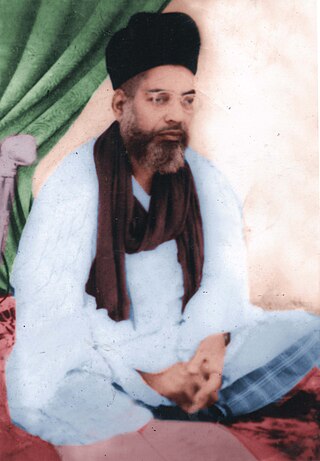Top Qs
Timeline
Chat
Perspective
Ghousi Shah
Indian Muslim Sufi (1893–1954) From Wikipedia, the free encyclopedia
Remove ads
Moulana Ghousi Shah (Urdu: مولانا غوثى شاه) (1 July 1893 – 6 June 1954) was a Muslim Sufi saint and poet from Hyderabad, India.[3][4] He was the Janesheen (successor) to Machiliwale Shah in the Sufi lineage.
This article contains wording that promotes the subject in a subjective manner without imparting real information. (June 2023) |
Remove ads
Biography
Born on (corresponding to 1 July 1893 in the Gregorian calendar) in Hyderabad, India, Ghousi Shah was a Sunni Muslim adhering to the Hanafi school of thought. He received his education in Urdu, Arabic, and Persian under the guidance of Maulana Hameed-Ullah, delving deeply into Islamic sciences like Fiqh, Hadith, and Tafsir.
Four years before his death, in a speech to his disciples, he appointed his son, Moulana Sahvi Shah, as his spiritual successor, stating that this decision was a divine will.[5]
Remove ads
Title
Influence
Summarize
Perspective
According to The Siasat Daily Newspaper, Hyderabad, India,[3] approximately ten thousand people followed him in India.
- Maulana Abdus Samad, a student of Deoband, said: "I have not seen a greater interpreter of Masnavi Maulana Rum than Ghousi Shah."
- Seemab Akbarabadi wrote, "How I only wish I had seen him from a distance."
- Maulana Maududi commented on his learning after meeting him in the company of Nisar Yar Jung.
- Ashraf Ali Thanwi commented on his interpretation of determinism.
- Syed Abdullah Shah said upon his death: "Once I went to listen to Hazrath Ghousi Shah Saheb’s sermon. He explained the intricacies of Tauhid quite coherently. Only a man of his caliber could do it. One has to wait for ages to expect such persons of distinction. Hazrath is no more. We must make the best use of the presence of Hazrath Sahvi Shah, his successor – a boon for all of us."
- Nawaab Liaqat Jung said, "In fact, a movement of this type was founded by Hazrath Ghousi Shah, who organized a huge movement to inculcate religious values", while also acknowledging the efforts of the Namaz committee in propagating the movement of Namaz.
- Hazrath Syed Badshah Hussaini Quadri commented that Ghousi Shah dedicated his life to the propagation of Islam, Iman (faith), Tauhid (faith in the unity of God), piety, and Ihsan and that his books and teachings are still available.[3]
Successors (Khulafa)
- Ahamed Mohiyudheen Noorishah Jeelani
- Maulana Hakeem
- Abdur Rasheed.[2][6]
Books
- Kanze Maktoom (Sharha Mathnawi Bahrul Uloom)[2]
- Majoone Mohammadi[6]
- Jawahere Ghousi[6]
- Maqsad-E-Bayet (Discusses bayet – taking a spiritual pledge, including its purpose, virtues, necessity, and kinds).[3][2][6]
- Tayyebat-E-Ghousi (A collection of poems – Hamd, Naat, Manqabat, Rubaiyat—with thumris on the Prophet and Meraj).[3][2][6]
- Noor-Un-Noor (A book on the interpretation of Wahadatul Wujood).[3][2]
- Kalima-E-Tayaba The book discusses the significance of Kalima-e-Tayyiba, a fundamental concept in Islam, as well as topics such as self-awareness, divine awareness, revelation, and prophethood.
- Falahe Muslims[6]
- Maeete Elah[2]

Remove ads
Death
Ghousi Shah died on 6 June 1954 in Hyderabad, corresponding to the date 4 Shawwal 1373 AH in the Islamic calendar. He was buried in his father's mosque, Masjid-e-Kareemullah Shah, located at 15-6-341, Begum Bazaar, Hyderabad, India.[2]
Urs
His annual Urs is organized by his successor, Maulana Ghousavi Shah, every year on 4 Shawwal. Maulana Ghousavi Shah (Secretary General of The Conference of World Religions and President of the All India Muslim Conference)[2][6][7] and other religious scholars preside over the function. The Urs celebrations conclude with sama (Qawwali program) at Baith-Un-Noor, Hyderabad.[2]
See also
References
Wikiwand - on
Seamless Wikipedia browsing. On steroids.
Remove ads

